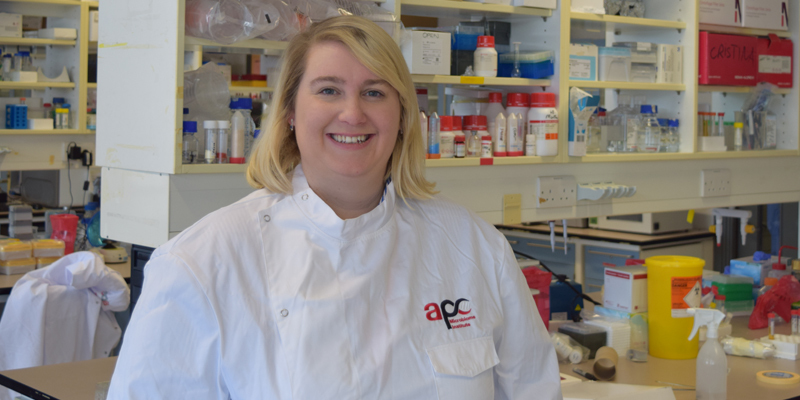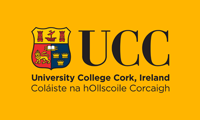News
APC researcher secures major funding from US Foundation for brain tumour research

A researcher at APC Microbiome Ireland (APC), a world-leading SFI funded research centre based at University College Cork (UCC), has received significant funding from a US based charity to investigate treatments for some of the deadliest brain tumours.
Dr Lily Keane has been awarded $390,000 (approximately €360,000) from the ChadTough Defeat DIPG (Diffuse Intrinsic Pontine Glioma) Foundation. The ChadTough charity was founded by two American families who lost their sons Chad, aged 5 and Michael, aged 6 to DIPG, an extremely aggressive paediatric brain tumour that occurs in the developing brainstem, with a 5-year survival rate of under 1%. Typically, DIPG children are given just 9 months to live upon diagnosis.
DIPG is the leading cause of brain tumour-related deaths in children. Annually, 5-10 children in Ireland are diagnosed with DIPG, with the standard of care limited to radiation, which only mitigates symptoms temporarily. New treatment options are, therefore, desperately needed.
Previous work by Dr. Keane during her postdoctoral work at the Karolinska Institute in Stockholm, Sweden showed that the immune cells of the brain, called microglia, help DIPG tumour cells to grow and spread into neighbouring brain areas. Dr Keane’s research programme at APC, will further build on these important findings, focusing on strategies for targeting and depleting different types of microglia present in DIPG. Dr. Keane will also examine the interplay between these specialised microglia cells and the DIPG tumour cells and characterise the signals that promote DIPG growth. By combining novel immunotherapies targeting microglia, with radiation or chemotherapy, Dr. Keane hopes to improve survival outcomes for young DIPG patients.
Dr. Keane also plans to examine the potential link between the gut microbiome and brain tumour development in both DIPG and other aggressive gliomas such as glioblastoma that is the most common glioma in adults. Dr. Keane will therefore utilise the wealth of knowledge and world-renowned expertise that currently exists at APC, specifically within the APC’s Brain-Gut-Microbiome Axis group, to unravel these gut-brain tumour interactions and how they can be manipulated to boost anti-tumour immunity. Dr. Keane will also be working closely with Cancer Research@UCC, directed by Professor Roisin Connolly, to translate research findings into clinical benefit for brain tumour patients.
Dr Keane said “DIPG is a really devastating disease and I’m honoured to receive this award from such an incredible charity, that has been instrumental in funding game-changing research. It’s my hope that targeting microglia can be a future treatment strategy for DIPG children. I’m also delighted to return to UCC and to join APC and look forward to understanding the interplay between the gut microbiome and brain tumour development’
Dr Keane returns to UCC, where she previously carried out a BSc in Genetics, after 13 years of international research experience in immunology and brain tumour research. She received her PhD from Queen Mary University in London, before holding research positions in the German Center for Neurodegenerative Diseases in Bonn, Germany, and at the Karolinska Institute in Stockholm, Sweden.
Professor Paul Ross, Director of APC said: "We are delighted to welcome Dr Keane to the APC team. The gut microbiome is an emerging player in neurological disease and cancer and Dr Keane’s research will provide new insight into gut-tumour dynamics. This funding from the ChadTough Defeat DIPG Foundation is a very important in her research to improve outcomes for young DIPG patients.”
Professor Roisin Connolly, The Professor Gerald O'Sullivan Chair in Cancer Research said: “The team at Cancer Research @UCC congratulate Dr Keane on her success and are delighted to welcome her back to Cork to pursue her ground-breaking research in this rare brain tumour affecting children. This appointment aligns with the recent return of Professor Jack Gleeson to Cork, who is an expert in adult brain tumours and clinical trials. We look forward to collaborating with Dr Keane as we develop our neuro-oncology research portfolio regionally, with the goal of improving outcomes for those affected by brain cancers.”
Professor John Cryan, UCC Vice President for Research and Innovation said: “I would like to extend a warm welcome to Dr Lily Keane. Her paediatric research in brain related disorders will be a significant addition to UCC’s existing world leading research at APC Microbiome Ireland and the INFANT Centre. This research aligns with several UCC Futures thematic areas – Future Medicines, Children, and Future Ageing and Brain Science, and the funding received will help address treatment challenges associated with paediatric brain tumours.”


